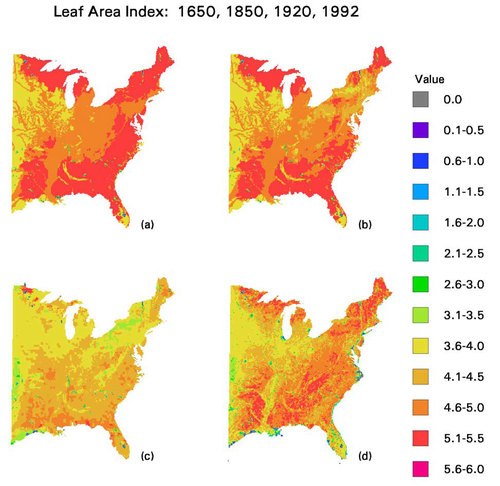I really want to thank Michael Tobis at environmentalist hang-out Grist. For years people have accused me of over-reading the intentions of climate catastrophists, so I am thankful that Tobis has finally stated what climate catastrophists are after (emphasis in the original, but it is the exact phrase I would have highlighted as well)
Is infinite growth of some meaningful
quantity possible in a finite space? No scientist is inclined to think
so, but economists habitually make this
claim without bothering to defend it with anything but, "I'm, an
economist and I say so", or perhaps more thoughtfully, "hey, it's
worked until now".
Such ideas were good approximations in the past. Once the finite
nature of our world comes into play they become very bad approximations. You know, the gods of Easter Island
smiled on its people "until now" for a long time, until they didn't.
The presumption of growth is so pervasive that great swaths of economic
theory simply fail to make any sense if a negative growth rate occurs.
What, for instance, does a negative discount rate portend? ...
The
whole growth thing becomes a toxic addiction. The only path to a soft
landing is down; we in the overheated economies need to learn not just
to cope with decline but to celebrate it. We need not just an ideology
but a formal theory that can not only cope with reduced per capita
impact but can target it.
Decline isn't bad news in an airplane. Decline is about reaching
your destination. Perhaps there is some level of economic activity
beyond which life gets worse? Perhaps in some countries we have already
passed that point? Could the time where we'd all be better off with a
gradual decline have arrived? How much attention should we pay to the
folks who say we should keep climbing, that there's no way we can run
out of fuel, that we'll think of something?
So there it is, in the third paragraph, with no danger of misinterpretation. These folks want economic decline. That's a fancy way of saying "We want you poorer."
I could spend weeks writing about the fallacies and anti-human philosophy embedded in these four paragraphs, but here are just a few reactions.
The Zero Sum Fallacy
Every generation has people, like Mr. Tobis, who scream that we are all living in a petri dish and this is the generation we run out of Agar. Of course they are always wrong. Why?
Well, first, the prime driver of economic growth is not resources but the human mind. And the world of ideas has no capacity limits. This is an issue that Julian Simon wrote about so clearly. Tobis is trying to apply physical models to wealth creation, and they just don't apply. (and by the way, ask the passengers of TWA flight 800 if decline isn't bad news in an airplane).
Further, if we talk about the world of resources, we currently use a trivial fraction of the world's resources. By a conservative estimate, we have employed at most (including the soil we till for agriculture, extracted minerals, etc) less than 0.0001% of the earth's mass. In terms of energy, all energy (except nuclear) comes ultimately from the sun (fossil fuels, hydropower reservoirs, etc are just convenient storage repositories of the sun's energy). We currently use an infinitesimal percentage of the sun's energy. I wrote much more on the zero-sum wealth fallacy here. And here is my ancestor blogger in Coyote Broadsheet making the same fallacy as Mr. Tobis back in the 19th century, writing on the Peak Whale Theory.
Wealth Benefits the Environment
Just like actual 20th century data tends to undermine catastrophic climate forecasts, experience over the last century tends to contradict the notion that growth is devastating to the environment.
We can find the best example right here in the environmental Satan called the USA. The US has cleaner air and water today than in any time in decades. Because of technology and growth, we can produce more food on less land than ever -- in fact the amount of land dedicated to agriculture has shrunk for years, allowing forests to steadily expand in the US for over eighty years (that is, until the environmentalists got the government to subsidize ethanol). No one in Brazil would be burning huge tracts of the Amazon if they enjoyed the agricultural productivity we do in the US. Sure, we have done some things that turn out to be environmentally bad (e.g. lead in gasoline) but our wealth has allowed us to fairly painlessly fix these mistakes, even if the fixes have not come as fast as environmentalists have desired.
I will confess that the Chinese seem hell bent on messing up their air and water as much as possible, but, just like the United States, it will be the wealthy middle and upper class of China that will finally demand that things get cleaned up, and it will be their wealth, not their poverty, that allows them to do so. Similarly, I don't think CO2 reduction will do much of anything to improve our climate, but if we find it necessary, it will be through application of wealth, not squalor, that we overcome the problems.
Here is a simple test: Which countries of the world have the worst environmental problems? Its is the poorest countries, not the wealthiest.
Growth / Climate Tradeoffs
For the sake of argument, let's assume that man-made global warming increases severed storm frequency by 20%, or by 3 or 4 extra hurricanes a year (why this probably is not happening). Even a point or two knocked off worldwide economic growth means hundreds of trillions of dollars in lost annual GDP a century from now (2% growth yields a world economy of $450 trillion in a century. 3% growth yields a world economy $1,150 trillion in a hundred years.) So, using these figures, would the world be better off with the current level of hurricanes, or would it be better off with four more hurricanes but $700 trillion a year more to deal with them. Hmmm. Remember, life lost in a hurricane correlates much higher with poverty in the area the hurricane hit rather than with storm strength, as demonstrated by recent cyclones in Asia. This general line of reasoning is usually described as warmer and richer vs. cooler and poorer.
I cannot speak for Mr. Tobis, but many environmentalists find this kind of reasoning offensive. They believe that it is a sin for man to modify the earth at all, and that changing the climate in any way is wrong, even if man is not hurt substantially by this change. Of course, in climate, we have only been observing climate for 30-100 years, while climate goes through decadal, millennial, and even million-year cycles. So it is a bit hard to tell exactly what is natural for Gaia and what is not, but that does stop environmentalists from declaring that they know what is unnatural. I grew up in the deep South, and their position sounds exactly like a good fiery Baptist minister preaching on the sins of humanity.
More from Jerry Taylor, who got Tobis started on his rant in the first place.
Postscript: Here is an interesting chicken or the egg problem: Do you think Mr. Tobias learned about man-made global warming first, and then came to the conclusion that growth is bad? Or did Mr. Tobis previously believe that man needed to be fewer and poorer, and become enthusiastic about global warming theory as a clever packaging for ideas most of the world's population would reject? The answer to this question is a window on why 1) the socialists and anti-globalization folks have been so quiet lately (the have all jumped onto global warming); 2) no one in the global warming movement wants to debate the science any longer (because the point is not the science but the license to smack down the world economy) and 3) why so much of the Bali conference seems to be about wealth transfers than environmentalism.





